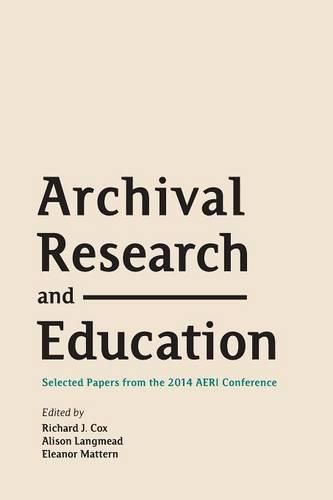Readings Newsletter
Become a Readings Member to make your shopping experience even easier.
Sign in or sign up for free!
You’re not far away from qualifying for FREE standard shipping within Australia
You’ve qualified for FREE standard shipping within Australia
The cart is loading…






This title is printed to order. This book may have been self-published. If so, we cannot guarantee the quality of the content. In the main most books will have gone through the editing process however some may not. We therefore suggest that you be aware of this before ordering this book. If in doubt check either the author or publisher’s details as we are unable to accept any returns unless they are faulty. Please contact us if you have any questions.
The sixth annual Archival Education and Research Institute (AERI), hosted by the University of Pittsburgh School of Information Sciences in July 2014, brought together doctoral students and faculty engaged in Archival Studies from around the world, although principally from the United States. Supported by the Institute of Museum and Library Services, these institutes are designed to strengthen education and research, as well as support academic cohort building and mentoring in the archival community. This publication features fifteen essays by both emerging and established archival scholars and faculty from four continents. Subjects include: dictatorship archives in Brazil, affect and agency in the archives of the countries of the former Yugoslavia, archival images in recent movies, archival systems interoperability research, cross institutional usages of EAD 2002, Ernst Posner and archival scholarship in Washington, D.C., technical infrastructures and digital heritage preservation, the challenges of safeguarding intangible cultural heritage, enabling Big Data curation in a non-archival organization, personal archiving of Web pornography, the history and future of archival education in the United States, innovative archival teaching methods in China, rights in records as a platform for participatory archiving, and archival readings of Derrida’s Archive Fever. These contributions reflect the range of new archival research, the continuing maturation of archival education, and the growing international collaboration among archival scholars and faculty.
$9.00 standard shipping within Australia
FREE standard shipping within Australia for orders over $100.00
Express & International shipping calculated at checkout
This title is printed to order. This book may have been self-published. If so, we cannot guarantee the quality of the content. In the main most books will have gone through the editing process however some may not. We therefore suggest that you be aware of this before ordering this book. If in doubt check either the author or publisher’s details as we are unable to accept any returns unless they are faulty. Please contact us if you have any questions.
The sixth annual Archival Education and Research Institute (AERI), hosted by the University of Pittsburgh School of Information Sciences in July 2014, brought together doctoral students and faculty engaged in Archival Studies from around the world, although principally from the United States. Supported by the Institute of Museum and Library Services, these institutes are designed to strengthen education and research, as well as support academic cohort building and mentoring in the archival community. This publication features fifteen essays by both emerging and established archival scholars and faculty from four continents. Subjects include: dictatorship archives in Brazil, affect and agency in the archives of the countries of the former Yugoslavia, archival images in recent movies, archival systems interoperability research, cross institutional usages of EAD 2002, Ernst Posner and archival scholarship in Washington, D.C., technical infrastructures and digital heritage preservation, the challenges of safeguarding intangible cultural heritage, enabling Big Data curation in a non-archival organization, personal archiving of Web pornography, the history and future of archival education in the United States, innovative archival teaching methods in China, rights in records as a platform for participatory archiving, and archival readings of Derrida’s Archive Fever. These contributions reflect the range of new archival research, the continuing maturation of archival education, and the growing international collaboration among archival scholars and faculty.